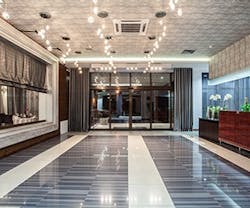LEED Certification Increases Hospitality Revenue
Hotels certified under the LEED program bring in more revenue than those without the certification, according to a study from Cornell University. By comparing the earnings of 93 LEED-certified hotels in the U.S. to 514 non-certified, comparable competitors, the study found that the LEED-certified facilities were able to substantially increase average daily rates (ADR) and revenue per available room (RevPAR).
Studying three years of hotel operation, the one year before LEED-certification was achieved and the two proceeding years, the authors compared mean average daily rates for the two classes of hotel. In the year before obtaining certification, the hotels that eventually achieved certification had an ADR that was an average of $10 higher than the non-certified competitors. After obtaining the certification, hotels' ADR was an average of $20 higher over the measured period.
When measuring revenue per available room, the study's authors point out that in the year prior to LEED certification, the hotels had a lower RevPAR than their competitors. This could possibly be due to the fact that many of the hotels measured were either being constructed or renovated during the year preceding certification, however, the mean RevPAR became equal at the year of certification and certified facilities' RevPAR rose more than $5 above the competitors for both the first and second years after certification.
Because most of the hotels had recently achieved the LEED distinction, the timepsan measured was limited. The authors of the study point out, however, that major hospitality companies like Marriott are building LEED into their design specifications, meaning that future studies will have a broader sample size. Also noted was that while most LEED hotels were upscale or luxury-establishments / properties, all of those studied saw significant revenue benefits.
"The questions was whether there is a revenue benefit from LEED. We found that the answer is absolutely yes," says Rohit Verna, one of the study's authors.
